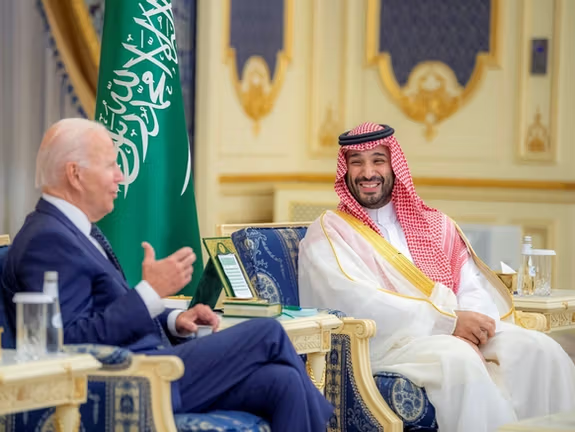The Biden administration has been trying to push Saudi Arabia and Israel to sign a peace agreement for months. A deal was said to be close last summer but it fell apart and effectively died on 7 October 2023, when Iran-backed Hamas rampaged Israeli border areas, killing several hundred civilians, and Israel began its onslaught on Gaza, which has killed at least 30,000 people.
Now in his last six months in office, Joe Biden seems eager to somehow revive the pact with Saudi Arabia, even though Israel has rejected any notion of a Palestinian state, which is central to Saudi Arabia’s offer of ‘normalization.’ A trilateral deal, therefore, seems unlikely. But President Joe Biden is hoping that a second-choice bilateral deal with Saudi Arabia would help restrain the Israeli government, further isolate Iran, and keep the door open to a potential deal between Israel and Saudi Arabia at a later date.
“These people imagine the matter [of Palestine] will be settled if they persuade regional countries to normalize relations with the Zionist regime,” Khamenei said in a speech Wednesday. “They’re wrong. The problem won’t be solved until Palestine is returned to the Palestinian people.”
Khamenei did not mention the kingdom in his speech, but it was not hard to guess who he had in mind. The regime in Iran would not welcome any such arrangement, bilateral or trilateral, especially at a time of marked improvement in its relationship with Saudi Arabia –and a time when the crisis in Gaza seems to have bettered its standing in the eyes of the public in some parts of the region.
Iran’s unprecedented attack against Israel last month was cheered on by many across the Muslim world, who resent what they view as their own leaders’ inaction in the face of Israeli brutalization of Palestinians in the Occupied Territories. But the attack also drew some Arab governments closer to Israel, as they joined forces with the US to fend off Iran’s large-scale missile and drone attack.
This new alignment could be cemented if the Biden administration manages to persuade Israel and Saudi Arabia to ‘normalize’ ties. But that’s a big if, since the kingdom is calling for a ceasefire in Gaza and the establishment of an independent Palestinian state, both of which the Israeli prime minister, Benjamin Netanyahu, has rejected. And on the other side, Biden has little time left in the White House to get his darling deal done.
Some experts say if a trilateral agreement is unlikely, a bilateral one without Israel, is almost impossible, because it would have to be approved by the Senate, and Senators would not do so if Israel is excluded.
“Now is the time to be crystal clear about what can and cannot happen in the US Senate regarding potential agreements between the US and Saudi Arabia,” Senator Lindsey Graham (R-SC) posted on X Wednesday. “Without normalizing the Israeli-Saudi relationship and ensuring the security needs of Israel regarding the Palestinian file, there would be very few votes for a mutual defense agreement between the US and Saudi Arabia. This has been true since the very beginning and remains so today.”









